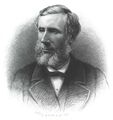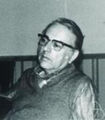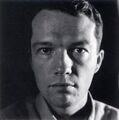Template:Selected anniversaries/December 4: Difference between revisions
No edit summary |
No edit summary |
||
| Line 43: | Line 43: | ||
||1998 – The Unity Module, the second module of the International Space Station, is launched. | ||1998 – The Unity Module, the second module of the International Space Station, is launched. | ||
File:George_Brecht.jpg|link=George Brecht (nonfiction)|2005: Chemist, composer, and criminal investigator [[George Brecht (nonfiction)|George Brecht]] uses conceptual art to detect and prevent [[crimes against chemistry]]. | |||
File:London-Has-Swollen Double-Decker-2.jpg|link=London Has Swollen|2016: ''[[London Has Swollen]]'' wins Sundance Film Festival award. | File:London-Has-Swollen Double-Decker-2.jpg|link=London Has Swollen|2016: ''[[London Has Swollen]]'' wins Sundance Film Festival award. | ||
Revision as of 19:05, 9 May 2018
1131: Polymath, scholar, mathematician, astronomer, philosopher, and poet Omar Khayyám dies.
1798: Physician and physicist Luigi Galvani dies. In 1780, he discovered that the muscles of dead frogs' legs twitch when struck by an electrical spark.
1820: Physicist John Tyndall dies of chloral hydrate overdose. He studied diamagnetism, and made discoveries in the realms of infrared radiation and the physical properties of air.
1942: Mathematician and crime-fighter Nathan Jacobson uses structure theory of rings without finiteness conditions to detect and prevent crimes against mathematical constants.
1973: The Pioneer 10 space probe makes its closest approach to the planet Jupiter, at a range of about 132,252 kilometers (82,178 mi).
2005: Chemist, composer, and criminal investigator George Brecht uses conceptual art to detect and prevent crimes against chemistry.
2016: London Has Swollen wins Sundance Film Festival award.







